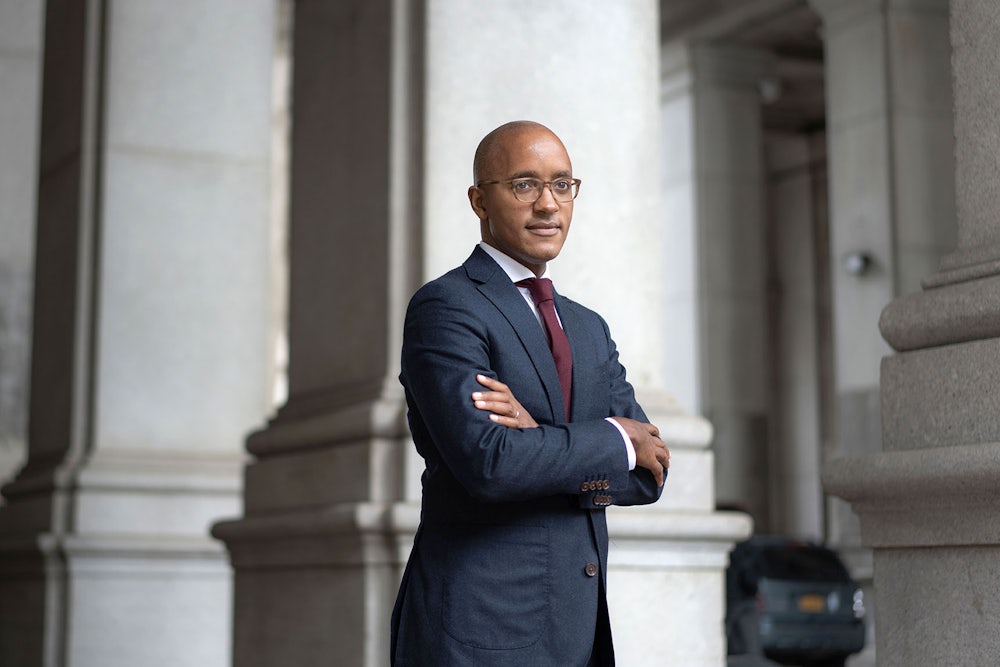On December 21, 2022, Damian Williams, the U.S. attorney for the Southern District of New York, or SDNY, stood behind a podium, ready to announce his office’s latest catch. Forty-two years old, thin, his head shaved bald, Williams wore a cutaway collar shirt, trim suit, and tortoiseshell glasses. Lately, he had been making a lot of announcements, but this one had attracted major media interest in advance, teed up as a potentially career-defining case. Hollywood studios were already developing several competing projects about the collapse of cryptocurrency exchange FTX and the fall of its founder, Sam Bankman-Fried, also known as SBF. Maybe someone would play Williams, too.
In early November, Bankman-Fried’s $32 billion crypto empire went from top industry player to bankrupt crime scene in about a week. By December 13, as part of an investigation spearheaded by Williams’s office, Bankman-Fried had been arrested in the Bahamas and charged with eight felonies. Williams alleged that SBF had stolen from customers, defrauded investors, and violated campaign finance laws. (The Securities and Exchange Commission also filed civil charges against him.)
A little more than a week after SBF’s arrest, Williams was offering a significant update. Caroline Ellison and Gary Wang, top associates of FTX founder Bankman-Fried, had pleaded guilty to fraud charges. Williams said they were cooperating with authorities. The SDNY was now well on its way to building a strong, wide-ranging case against Bankman-Fried and still unnamed co-conspirators. More indictments were all but assured—and indeed, Williams introduced a superseding indictment against SBF, with four more charges, in late February.
Williams spoke plainly, wielding the rhetorical authority that comes from being one of the country’s top prosecutors. “Come see us before we come see you,” Williams had warned SBF’s other potential co-conspirators the week prior. On December 21, he reprised the message: “Our patience is not eternal.”
Williams then offered a major update: After a short spell in a notoriously grim Bahamian prison, SBF had agreed to be extradited and was already in FBI custody, bound for New York. SBF reportedly wasn’t told until he was in custody that his erstwhile friends and colleagues had turned on him.
The SBF investigation has the potential to be lengthy and complex, encompassing a vast international network of companies, hundreds of thousands of creditors, missing billions of dollars (or their equivalent in once-valuable cryptocurrencies), influence peddling, and campaign finance violations with as yet unknown co-conspirators. Even if no politicians are indicted, SBF’s extensive reach—a third of Congress received donations from the crypto mogul or his colleagues—casts the investigation firmly in the “politically sensitive” category. In December, Williams asked that politicians return SBF’s donations.
Rife with fraud and shady financial dealings, the broader crypto market collapse has produced no shortage of potential criminal defendants. Williams’s office has indicted lower-level crypto offenders—in cases that include an insider trading scheme at Coinbase and a $3 billion Bitcoin theft—but SBF is something more: not just a crypto industry villain but an alleged corporate fraudster whose name has already been added to the cursed pantheon of Bernie Madoff and Ken Lay.
It’s a landmark criminal case, thanks to the colorful story, the political influence of the defendant, and the size of the alleged theft—at least $8 billion. The SDNY launched a dedicated task force to handle the investigation. In an age of widespread corporate and political impunity, it’s rare that a CEO is held criminally accountable. This is a test case for Williams, who holds one of the highest-profile positions for a lawyer in the country, one that has previously launched careers for the likes of Preet Bharara and James Comey. Williams didn’t come into office with the reputation of a reformer, but there is a populist tint to the FTX debacle, with more than a million spurned customers hoping for justice. SBF has come to stand in for all of crypto’s sins. He’s now treated as an emblematic American grifter, though his trial won’t even begin until October.
Before SBF, Williams’s most high-profile case was that of Ghislaine Maxwell, whom he prosecuted for sexually abusing children and facilitating the crimes of Jeffrey Epstein. Maxwell was found guilty and sentenced to 20 years in prison, but notably, no other Epstein co-conspirators or members of his network have been arrested in the United States. The SBF case has already proved more expansive. “This investigation is very much ongoing,” Williams said in December, hinting at a potentially explosive year ahead, “and it’s moving very quickly.”
Nominated by President Joe Biden in August 2021, Williams became the first Black U.S. attorney in the SDNY’s 232-year history, a major distinction in an office that still only employs a handful of Black attorneys. He’s been busy during those first 18 months. He launched a civil rights investigation into the Mount Vernon Police Department, which had been accused of widespread misconduct. He indicted New York’s lieutenant governor for bribery and the former president of Honduras for drug trafficking. His office also prosecuted finance industry executives, members of the Genovese crime family, and an Islamic State supporter who murdered eight people by running them down with a truck on the Hudson River Park bike path in October 2017.
In May 2022, Williams gave a eulogy at a memorial for Supreme Court Justice John Paul Stevens, for whom he clerked. “Our nation stands on troubled soil today,” Williams said as part of the eulogy. “That is a fact. And the justice did not believe in airbrushing facts. So let’s not do that.” Merrick Garland—for whom Williams also clerked—appointed Williams chair of a 13-member panel of U.S. attorneys that advises the attorney general. Williams has also become involved in the legal fight over the disastrous conditions at Rikers Island jail complex. Citing the “extraordinary level of violence” there, he threatened to put the facility under federal control. Unlike progressive Democratic politicians like Alexandria Ocasio-Cortez, however, he has not pushed for the closure of Rikers.
Raised in Atlanta, Williams came up through elite institutions—prep school, Harvard, Cambridge, and finally law school at Yale, where he was an editor of the law journal. He wrote two articles about Hurricane Katrina, one about Black voting rights in post-storm New Orleans and the other about potential reforms for FEMA emergency housing, which at the time, Williams noted, was responsible for sheltering more than one million disaster victims. When the law journal decided to add an ombudsman, the editor in chief chose Williams.
He made political connections early, working as a field organizer on John Kerry’s 2004 campaign, as an assistant to Democratic National Committee chairman Terry McAuliffe, and as a volunteer on Harold Ford Jr.’s 2006 Senate campaign. Williams is friends with Natalie Portman—they met in college, volunteering for the same arts charity—and has been described by friends as disciplined, frugal, and circumspect, someone who chooses his words carefully.
After his clerkships, Williams worked a two-and-a-half–year stint at white-shoe firm Paul, Weiss, Rifkind, Wharton & Garrison. But by 2012, Bharara had poached him to be a staff lawyer for the U.S. attorney’s office for the Southern District of New York. “He was a no-brainer hire,” Bharara later told The New York Times. Williams focused on financial and corporate crimes, but he was drafted by colleagues to help prosecute former New York state Assembly Speaker Sheldon Silver for bribery. (Silver was initially found guilty before winning an appeal. A retrial found him guilty. He made another, partially successful appeal, and later went to prison, where he died in January 2022.) After six years, Williams was made chief of the Securities and Commodities Fraud Task Force. (Williams’s office didn’t respond to a request for an interview.)
With its responsibilities including political corruption cases, the U.S. attorney’s office was a turbulent place during Donald Trump’s administration. In March 2017, Trump fired Bharara. In June 2020, Trump fired Bharara’s successor, Geoffrey Berman, a Republican, after Berman’s office prosecuted Trump cronies like Michael Cohen and Lev Parnas. Throughout his tenure, Attorney General Bill Barr peered over the SDNY’s shoulder, trying to stymie investigations into Trump. (Berman called Barr a liar, “thuggish,” and a “gross and colossal bully.”) Last November, SDNY told a judge that it would not file criminal charges against former New York mayor and Trump adviser Rudy Giuliani related to his work in Ukraine.
Crypto crime might seem niche—the tech industry has already moved on to its next mania, artificial intelligence—but the SBF case has proved that it can touch finance, political corruption, regulatory policy, and national security. Such cases frequently involve personnel from the FBI, Treasury Department, IRS, SEC, and Drug Enforcement Administration. Williams described this particular investigation as an “all-hands-on-deck moment” for his office.
The SBF prosecution comes as the Biden administration is bringing a wide range of regulatory enforcement and legal actions against a crypto industry seen as a rogue operator routinely in violation of statutes around money laundering, wire fraud, and banking. The White House established dedicated crypto crime groups at the Department of Justice and FBI, and directed agencies across the government to coordinate on crypto policy. Since the market crash began last spring—precipitating numerous bankruptcies—a number of indictments, civil suits, and settlements have appeared. Aggrieved crypto investors are seeking restitution and the prosecution of industry executives.
In the case of FTX, Williams’s office moved rather quickly, filing a sealed indictment less than a month after the collapse of the company. For Williams, who has the résumé of someone who’s checked every box of meritocratic success, SBF could be the high-profile prosecution that elevates him from being simply another nice suit behind a very powerful podium. The U.S. attorney for the Southern District of New York is famously a stepping stone job. Rudy Giuliani rode his mob prosecutions to a draconian, “tough on crime” stint as New York’s mayor. Comey spent less than two years in the job before being brought to the Department of Justice, where he worked on torture and surveillance programs. After being fired by Trump, Bharara chose the relatively more ennobling career of podcasting.
Williams has publicly expressed little, if any, interest in elected office, but his Democratic ties run deep. One could imagine him eventually joining—or succeeding—his mentor Merrick Garland at DOJ. At Williams’s investiture, which he decided would take place at an armory in Harlem that belonged to the Harlem Hellfighters, a Black infantry unit renowned for its service in World War I, Garland hymned his former clerk. The attorney general said he had surveyed Williams’s colleagues, and that they described him as “brilliant, diligent, public-spirited, kind, unassuming, humble.” Garland added “wise” to the list of superlatives.
Regarding Williams’s future as the boss of SDNY, Garland offered an impish warning. “As every former AUSA [assistant U.S. attorney] knows, being an AUSA is the best job we ever had—it has all the satisfaction of doing public service, all the excitement of investigation and trial, with none of the headaches of running the office,” said Garland. “Damian, are you sure about this?”
Williams hasn’t hesitated, looking quite sure early in the job. “We continue to work around the clock,” he said after announcing the guilty pleas of Caroline Ellison and Gary Wang. “And we are far from done.”






